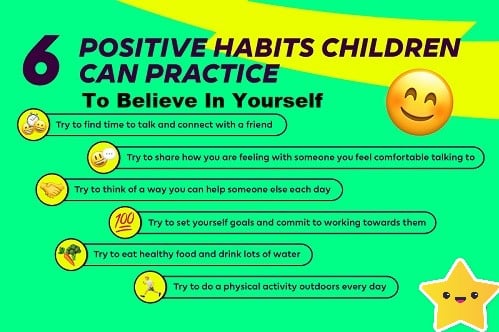When I was twenty-two years old, I wanted two things: 1. To be understood. 2. For people to think I was good at my job....Read more
Being yourself around kids is of basic importance because of numerous important reasons. First and basic, truth fosters a strong feel of belief and connection. Kids are remarkably the feeler and can quickly figure things out when a person is being truthful.
Yo can also attract kids by being yourself for them. And sincerity, which bureaucracy the idea for a meaningful and sincere courting.
Being yourself around kids sets a great example for them to accept the wordy with. kids are in a section of coming across. their very own identities and personalities. When they observe kids easily embracing their true selves, they check that it’s no longer useful proper but also favorite to be real. This motivates them to develop self belief and shallowness. They navigate their journey of self-discovery.

Showing your real self enables you to create around where open communication is. And emotional expression is valued. Kids are more likely to percentage their thoughts feelings, and concerns after they sense that. The adults around them are approachable and honest. This results in more healthy interactions and higher problem-solving. And the possibility for kids to offer suitable steering and support.
Being yourself around children lets you version excellent conduct and values. kids regularly check by using statements. And your truth can toughen important developments, which include empathy. Kindness and respect for differences.
Why Is It Important To Believe In Yourself For Kids
Believing in yourself is important for kids’ development and destiny achievement. Self-believe cultivates a positive self-image. When kids have confidence in their capabilities and real worth, they may be much more likely to approach difficult situations in an enjoyable way. And a can-do attitude. This positive self-believe will become the discovery for tackling barriers and is trying for private growth.
Believing in yourself encourages goal and resolution. Children who have self-assurance are much more likely to set bold dreams. And work permanently to get them. They are inspired by the concept that their efforts will generate great outcomes. Main to a more potent painting and a feel of art.
Self-belief no doubt impacts social interactions. Confident kids tend to engage more simply with friends. Express their critiques, and take part actively in institutional sports. This contributes to developing healthful relationships: powerful communication abilities and an experience of belonging.
Benefits of being yourself around kids
Being yourself around kids gives numerous enormous benefits that contribute to fine interactions and their universal improvement.
Firstly, to set up a true connection. Kids are perceptive and can sense when someone is being sincere. By being yourself, you create a basis of belief and openness. They grow a deeper and greater meaningful bond with kids.
It is a high-quality instance for self-believe.. When kids have a look at adults embracing their actual selves, they analyze that it’s okay to be specific and truthful. This encourages them to broaden their self-confidence and truthfulness, which can be important for their private growth.
So, being yourself around children gives benefits consisting of texture agreement with them, setting a superb example, promoting conversation, fostering creativity, and nurturing empathy. Your authenticity plays a pivotal role in shaping their attitudes. Behaviors and ordinary development in a positive and meaningful way
How do you teach self-love to children?
Teaching self-like to children is an important aspect of their emotional development. It includes helping them to construct a wonderful self-love and expand shallowness. And cultivate a strong sense of self-love. Here’s an extra precise technique on how to gain this:
- Model Healthy Self-Love. Children regularly research by looking at the behavior of adults around them and model self love via your movements and phrases. Demonstrate self-love, wonderful self-speak. And the capacity to recognize mistakes without harsh self-love.
- Create a Supportive Environment. Foster a surrounding wherein youngsters feel secure expressing their thoughts and feelings. Encourage open conversation and active listening. This helps them increase a healthy relationship with themselves and others.
- Encourage Self-Acceptance. Teach kids that it’s okay to be themselves. Emphasize that everyone has strengths and weaknesses. And that their distinctiveness is what makes them special. Avoid comparisons and negative labeling.
- Acknowledge Emotions. Help children apprehend and label their feelings. Please encourage them to express their emotions without judgment. This permits them to develop emotional intelligence and a sense of self-cognizance.
- Promote Self-Care. Teach the significance of taking care of their physical, intellectual, and emotional well-being. This can include getting sufficient sleep and consuming nutritious meals. accomplishing bodily activities they enjoy, and training in rest techniques.
- Celebrate Achievements. Celebrate their accomplishments, irrespective of how small. Acknowledge their efforts and development. This facilitates them to build a wonderful self-picture. And recognize that their movements have value.
What is the self love of kids?
Self-love in children refers back to the improvement of high quality. And they are nurturing dating with oneself. It encompasses various elements in their emotional, intellectual, and bodily proper-being. Here’s a greater unique rationalization of what self-love involves for kids:
- Positive Self Concept. Self-love entails assisting kids to form a fantastic self-idea. In this approach, they see themselves as valuable and worthy, regardless of their imperfections or mistakes. They learn to include their uniqueness and understand. that their well-worth isn’t always solely determined by external factors.
- Self-Esteem. Developing vanity is a big part of self-love. Children with healthful self-esteem believe in their talents and capabilities. They accept as accurate within themselves, their ability, and their ability to study and grow. They are extra resilient in the face of challenges and setbacks.
- Self-Care. Teaching children self-love entails imparting the significance of self-care. They learn to prioritize their bodily properly-being with—the aid of getting good enough relaxation. Eating nutritious foods and engaging in physical sports they revel in. They also understand the importance of nurturing their intellect—and emotional fitness through relaxation techniques, interests, and spending time with loved ones.
- Self-Compassion. Self-love teaches children to deal with themselves with kindness and compassion. They research to talk to themselves as they might to a pal. They are presenting information and assistance as opposed to harsh self-grievance. This self-compassion allows them to manipulate terrible feelings and challenges more efficiently.
Emotional Awareness. Kids working towards self-love increase emotional recognition. They are in song with their emotions and might express them healthfully.
Psychology of being yourself
The psychology of being yourself involves the complex interplay among your mind. Hormones, worried systems, and various physical features. That contributes to your identification, emotions, and behaviors; here’s proof of ways those additives come collectively:
- Brain and Identity. Your brain plays a pivotal function in shaping your experience of self. The prefrontal cortex is chargeable for decision making, personal expression, and moderating social conduct. Your brain processes sensory statistics and thoughts. And recollections, all of which contribute to your individuality.
- Neurotransmitters. Neurotransmitters are chemical messengers in the brain that affect temper, conduct, and feelings: dopamine and serotonin. And oxytocin is a few neurotransmitters associated with emotions like happiness and contentment. And social bonding. The stability of these neurotransmitters influences your ordinary mental nation. And contributes to your authentic self-expression.
- Hormones. Hormones are produced with the aid of numerous glands for your frame. Impact your physiology and experience of self. Cortisol, the stress hormone, affects how you respond to demanding situations. Testosterone and estrogen play roles in gender identity. And have an impact on feelings and behavior otherwise.
- Autonomic Nervous System. The autonomic apprehensive gadget controls involuntary bodily functions like coronary heart fee. Digestion and respiration. It has branches: the sympathetic anxious gadget, which triggers the “fight or flight” response. And the parasympathetic worried device, which promotes rest. Both units impact how you react to situations, specifically, your actual self.
- Mirror Neurons. Mirror neurons are brain cells that spark off while you look at someone else’s moves or Emotions. They allow you to empathize and recognize others. Contributing to social interactions. And shaping your conduct in terms of those around you.
- Body Language and Expression. The physiology of being yourself includes your body language. Facial expressions and vocal tone. These nonverbal cues talk about your feelings and intentions. You are allowing others to perceive your authenticity.
- Mind-Body Connection. Your mind, emotions, and physical sensations are interconnected. When you embrace your proper self, your mental country. It can influence your bodily nicely-being and vice versa. For example, working towards mindfulness or high-quality self-speak. It can impact your mood and physiological responses.
What happens when you start being yourself
When you begin being yourself, you embark on an adventure of self-discovery. Authenticity and personal boom. This process entails aligning your moves and thoughts. And behaviors, along with your proper identity. In place of conforming to societal expectancies or looking to please others.
Here’s what typically happens when you start being yourself:
Embracing your actual self requires a self-mirrored image and introspection as you become more aware of your values, pastimes, and strengths. And weaknesses, you benefit from a deeper understanding of who you are.
Being yourself means being actual and honest about your ideals, preferences, and persona. You surely express your mind, feelings, and evaluations without worry of judgment or rejection.
Embracing your proper self boosts your self-self belief. When you acknowledge and take delivery of who you’re. You experience more self-assuredness. as you’re not continuously trying to shape into roles that do not resonate with your true nature.
Authenticity promotes intellectual property-being. It reduces the stress and anxiety which could come from pretending to be someone you’re now not. Accepting yourself fosters a sense of internal peace and self-compassion.
When you are authentic, you entice those who respect you for who you are—fostering deeper and greater significant connections. Authenticity encourages open communication and vulnerability, which can be important for building robust relationships.
Being yourself encourages non-public development. You’re more likely to step from your consolation sector. Strive for new stories, and examine challenges. all of which contribute to growth and self-improvement.
Authenticity removes the need to constantly reveal. And regulate your conduct to match or meet others’ expectations. This results in less pressure and intellectual exhaustion. as you’re no longer expanding electricity on retaining a façade.
When you’re proper to yourself, you revel in a feeling of fulfillment and satisfaction living in alignment with your values. And passions lead to a greater significant and cause-driven lifestyle.
Your authenticity can encourage those around you to embrace their true selves by demonstrating the advantages of being genuine. You encourage others to discover their identity and express themselves authentically.

Final Words
Being yourself around youngsters is an effective manner to shape their person and self belief. And social interactions. By demonstrating truth, you provide. They have a precious life lesson that extends beyond surface behaviors.
Your actual expression allows them to construct a sturdy basis for healthy relationships. Self belief and emotional nicely-being. As your version of real. You equip kids with the gear they need to navigate the world honestly: integrity and a sense of self-confidence.
Related Articles About Kids:
- How To Teach Kids About Patience
- Why Are Kids So Energetic
- How To Encourage Kids To Be Positive
- How To Use Games To Teach Kids
- Why Are Kids So Loud
- Can Kids Eat Beer Battered Fish
- Why Are Hoodies So Comfortable

When I was twenty-two years old, I wanted two things: 1. To be understood. 2. For people to think I was good at my job. As a first time founder, I remember feeling under-qualified. I felt like an impostor—and it showed. I struggled to communicate my value in a way that my colleagues and potential investors could understand. I realized I needed to clarify my message and use social media as a tool to help me build my personal brand. This would help me look more credible, I thought. So I got to work. I updated my social media profiles, built a personal website, and began sharing my story online. The more content I shared, the more confident I became. And the more confident I became, the more credible I appeared. Now i am writing blogs for madeforkids.co.uk on different topics on kids.
- Latest Posts by Anna Vatuone
-
What Are The Uses Of A Drone
- -
What Are The Uses Of Playhouse
- -
How To Get A Child To Warm Up To You
- All Posts
